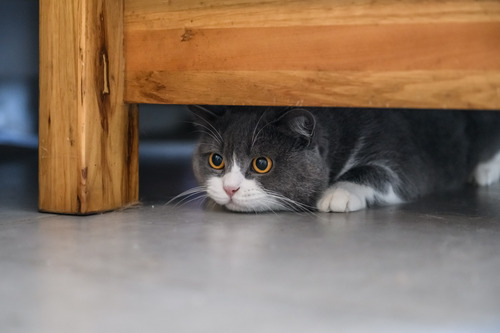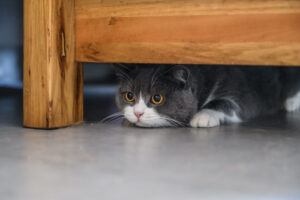Cats are naturally curious and cautious animals, and hiding is one of their most instinctive behaviors. If your cat suddenly disappears under the bed, squeezes behind the couch, or prefers the back of a closet, you might wonder why. In many cases, cat hiding is a normal response to stress, change, or even relaxation, but sometimes, it can point to an underlying health or emotional concern. This blog will explain why your cat might hide, so you can better support their comfort and know when it’s time to contact your veterinarian at Chino Valley Animal Hospital in Chino Valley, AZ. Call (928) 636-4382 or book an appointment online if your cat’s hiding seems unusual, persistent, or accompanied by other behavioral or physical changes.
Why Do Cats Hide? Instincts and Environmental Factors
Hiding is deeply ingrained in feline behavior. In the wild, cats rely on concealment to stay safe from predators and to stalk prey. Even domesticated cats retain this instinct. When your cat hides, they may simply be following a natural drive to find a quiet, secure space. However, not all hiding is created equal. Sometimes, cat hiding is a healthy sign that your cat feels comfortable enough in your home to seek out peaceful resting spots. Other times, it might signal fear, stress, or illness. Understanding the context behind their behavior helps you determine whether to give them space or schedule a veterinary visit.
Common Environmental Triggers
Several everyday changes can cause your cat to retreat to a hidden spot:
- New household members (pets, babies, or visitors)
- Loud noises like thunderstorms, fireworks, or home renovations
- Relocation or new furniture that alters their territory
- Routine changes, such as work schedules or feeding times
Cats are sensitive to disruption, and even small changes can make them feel uncertain. Giving them a predictable environment with safe spaces to retreat to often restores their confidence.
Stress and Anxiety as Causes of Cat Hiding
One of the most common reasons for cat hiding is stress. Cats often withdraw when they feel overwhelmed or frightened. Instead of vocalizing or acting out, they quietly seek solitude.
Stress can arise from subtle shifts like rearranged furniture or more significant life changes, such as moving to a new home or introducing another pet. While short-term hiding is usually nothing to worry about, consistent withdrawal may indicate chronic stress or anxiety that requires attention.
Signs of Stress in Cats
In addition to hiding, cats may display other stress-related behaviors, including:
- Reduced appetite or changes in eating habits
- Excessive grooming or hair loss
- Aggression or irritability
- Litter box avoidance
- Changes in sleeping or vocalization patterns
If you notice several of these behaviors, it’s time to talk with your veterinarian. Persistent anxiety can impact your cat’s health and well-being over time.
Creating a Calming Environment
You can help reduce stress by creating an environment that feels safe and consistent. Try to:
- Maintain a regular feeding and play schedule.
- Provide vertical spaces, like cat trees or shelves, for security.
- Offer cozy hideaways such as covered beds or boxes.
- Use calming pheromone diffusers or sprays designed for cats.
A calm, predictable home can help your cat feel more confident and reduce the urge to hide frequently.
Medical Reasons Behind Cat Hiding
While cat hiding often stems from emotional factors, medical issues can also cause this behavior. Cats instinctively conceal pain or illness, a survival trait from their wild ancestors. If your cat hides for long periods, avoids contact, or refuses food and water, it may be more than stress.
Pain or Discomfort
Cats experiencing pain from injuries, arthritis, or dental problems may withdraw to rest and avoid touch. They might also hiss, growl, or flinch when approached. Hiding allows them to protect themselves when feeling vulnerable.
Illness or Infection
Many health conditions can lead to increased hiding, including urinary tract infections, gastrointestinal issues, or respiratory infections. When cats don’t feel well, they often retreat to dark, quiet areas to minimize stimulation.
Age-Related or Cognitive Changes
Older cats may hide more frequently due to age-related health problems or confusion caused by cognitive decline. Senior cats can become disoriented, anxious, or sensitive to noise, leading them to seek comfort in familiar hiding spots. If your cat’s behavior changes suddenly or is accompanied by symptoms like lethargy, weight loss, vomiting, or decreased appetite, contact Chino Valley Animal Hospital at (928) 636-4382 to schedule an exam.
Social and Behavioral Factors That Influence Hiding
Cats are individuals with unique personalities. Some are social and curious, while others are naturally more reserved. Behavioral tendencies, past experiences, and early socialization play major roles in how often a cat hides.
Shy or Introverted Cats
Cats that were not well socialized as kittens may prefer to keep their distance, especially from strangers. For these cats, cat hiding is a coping strategy rather than a sign of distress. Providing gentle, consistent interactions helps build trust over time.
Multi-Cat Households
In homes with multiple cats, hiding can indicate social tension. Cats use hiding as a way to avoid conflict or to establish personal space. Ensure that each cat has their own feeding area, litter box, and resting spots to minimize competition.
Fear of Specific Triggers
Some cats develop fears of particular sounds, scents, or people. Identifying and minimizing exposure to these triggers helps your cat feel safer and more at ease in their environment.
When Should You Be Concerned About Your Cat’s Hiding Habit?
Occasional hiding is perfectly normal, but excessive or unusual withdrawal should raise concern. If your cat is hiding more than usual and showing other signs of distress or illness, it’s best to have them evaluated by your veterinarian. Here are some red flags to watch for:
- Refusal to eat or drink for more than 24 hours
- Difficulty moving or breathing
- Hiding combined with crying or vocalizing
- Avoiding favorite people or toys
- Sudden changes in litter box use
Behavioral and medical conditions often overlap, so a thorough veterinary examination at Chino Valley Animal Hospital can help identify the root cause.
What Should You Do If Your Cat Is Hiding?
If your cat is hiding, avoid forcing them out. Instead, create an environment that encourages curiosity and comfort.
- Give Them Space: Cats need time to process new experiences. Leave their hiding spot accessible and quiet until they feel ready to come out on their own.
- Use Positive Reinforcement: Sit near their hiding spot and speak softly. Offer treats, toys, or gentle play opportunities to help rebuild trust. Avoid loud noises or sudden movements that may startle them.
- Build Confidence Gradually: Cats thrive on routine and predictability. Maintain regular feeding and play schedules and use consistent cues to help them feel secure. Confidence-building activities like clicker training or puzzle feeders can also strengthen the bond between you and your cat.
When it comes to cat hiding, context matters. Whether your cat is shy, stressed, or unwell, your attentiveness and understanding make a big difference. Offer safe spaces, minimize household stress, and keep an eye on behavioral changes that could indicate discomfort. If you ever feel unsure about your cat’s hiding habits or suspect an underlying issue, the caring team at Chino Valley Animal Hospital is here to help. Call (928) 636-4382 or book an appointment online for a thorough evaluation. Your cat’s comfort, confidence, and happiness are worth every bit of care and attention.




